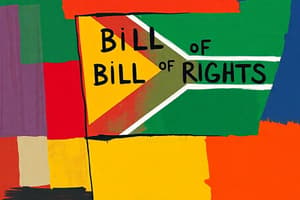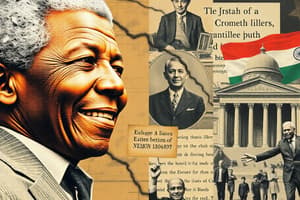Podcast
Questions and Answers
What is the basis of the South African Constitution?
What is the basis of the South African Constitution?
- Human dignity, equality, and freedom (correct)
- Economic, social, and cultural development
- State power and authoritarianism
- Majority rule and democracy
Which of the following rights is NOT protected by the Bill of Rights?
Which of the following rights is NOT protected by the Bill of Rights?
- Right to a safe environment
- Right to healthcare
- Right to bear arms (correct)
- Right to education
What is the primary role of the Constitutional Court?
What is the primary role of the Constitutional Court?
- To impose sentences on criminals
- To appoint judges to other courts
- To interpret the Constitution and ensure its upheld (correct)
- To make laws and govern the country
What is the main purpose of the Bill of Rights?
What is the main purpose of the Bill of Rights?
What is the balance the Constitution seeks to strike?
What is the balance the Constitution seeks to strike?
What is the significance of the Constitutional Court's judgments?
What is the significance of the Constitutional Court's judgments?
What is the primary source of human rights in South Africa?
What is the primary source of human rights in South Africa?
What is the primary function of the Constitutional Court in South Africa?
What is the primary function of the Constitutional Court in South Africa?
Which of the following fundamental freedoms is NOT guaranteed by the South African Constitution?
Which of the following fundamental freedoms is NOT guaranteed by the South African Constitution?
What is the purpose of the system of separation of powers in the South African Constitution?
What is the purpose of the system of separation of powers in the South African Constitution?
What is the relationship between individual rights and state power in the South African Constitution?
What is the relationship between individual rights and state power in the South African Constitution?
What is the composition of the Constitutional Court?
What is the composition of the Constitutional Court?
What is the scope of the Constitutional Court's jurisdiction?
What is the scope of the Constitutional Court's jurisdiction?
What is the significance of the right to human dignity in the South African Constitution?
What is the significance of the right to human dignity in the South African Constitution?
Flashcards are hidden until you start studying
Study Notes
Human Rights
- The South African Constitution is based on the principles of human dignity, equality, and freedom.
- The Constitution recognizes the inherent dignity and worth of every human being.
- The Bill of Rights (Chapter 2 of the Constitution) enshrines the rights of all individuals in South Africa, including:
- Civil and political rights (e.g. right to life, freedom of speech, assembly, and association)
- Economic, social, and cultural rights (e.g. right to education, healthcare, and a safe environment)
- Rights of children, women, and people with disabilities
Constitutional Court
- The Constitutional Court is the highest court in South Africa, with the final say on the interpretation of the Constitution.
- The Court has the power to declare laws and government actions unconstitutional.
- The Court consists of 11 judges, appointed by the President in consultation with the Judicial Service Commission.
- The Court's judgments are binding on all other courts and organs of state.
Individual Rights Vs. State Power
- The Constitution balances individual rights with the need for state power to regulate and govern.
- The Constitution sets limits on state power through the Bill of Rights and the principles of democracy and accountability.
- The Constitution also recognizes the importance of individual autonomy and the need for citizens to be protected from arbitrary state action.
- The balance between individual rights and state power is reflected in the Court's approach to issues such as:
- Limitations on freedom of speech and assembly
- Regulation of economic activity
- Protection of privacy and personal information
Fundamental Freedoms
- The Constitution protects fundamental freedoms, including:
- Freedom of speech, expression, and association
- Freedom of religion, belief, and opinion
- Freedom of movement and residence
- Freedom of trade, occupation, and profession
- These freedoms are essential to the development of individuals and the functioning of a democratic society.
- The Court has emphasized the importance of protecting these freedoms, while also recognizing the need for reasonable limitations in certain circumstances.
Human Rights in South Africa
- The South African Constitution is founded on the principles of human dignity, equality, and freedom, recognizing the inherent dignity and worth of every human being.
- The Bill of Rights enshrines the rights of all individuals, including:
- Civil and political rights (e.g., right to life, freedom of speech, assembly, and association)
- Economic, social, and cultural rights (e.g., right to education, healthcare, and a safe environment)
- Rights of children, women, and people with disabilities
The Constitutional Court
- The Constitutional Court is the highest court in South Africa, with the final say on the interpretation of the Constitution.
- The Court has the power to declare laws and government actions unconstitutional.
- The Court consists of 11 judges, appointed by the President in consultation with the Judicial Service Commission.
- The Court's judgments are binding on all other courts and organs of state.
Balancing Individual Rights and State Power
- The Constitution balances individual rights with the need for state power to regulate and govern.
- The Constitution sets limits on state power through the Bill of Rights and the principles of democracy and accountability.
- The Constitution recognizes the importance of individual autonomy and the need for citizens to be protected from arbitrary state action.
Fundamental Freedoms
- The Constitution protects fundamental freedoms, including:
- Freedom of speech, expression, and association
- Freedom of religion, belief, and opinion
- Freedom of movement and residence
- Freedom of trade, occupation, and profession
- These freedoms are essential to the development of individuals and the functioning of a democratic society.
Human Rights
- The South African Constitution protects the rights of all individuals, regardless of race, gender, or culture.
- The Bill of Rights outlines fundamental rights, including:
- Right to life
- Right to equality
- Right to human dignity
- Right to freedom and security of the person
- Right to privacy
- Right to freedom of religion, belief, and opinion
- Right to freedom of expression
- Right to assemble, demonstrate, and petition
The Constitutional Court
- The Constitutional Court is the highest court in South Africa, responsible for interpreting the Constitution.
- The Court has the power to declare laws and government actions unconstitutional.
- The Court consists of 11 judges appointed by the President in consultation with the Judicial Service Commission.
- The Court has jurisdiction over constitutional matters, including the interpretation of the Bill of Rights.
Fundamental Freedoms
- The Constitution guarantees fundamental freedoms, including:
- Freedom of association
- Freedom of movement
- Freedom of occupation
- Freedom of trade
- Freedom of expression
- Freedom of assembly, demonstration, and petition
- These freedoms are essential for individual development and democratic society functioning.
The System of Government
- The South African Constitution establishes a system of government based on the separation of powers.
- The three branches of government are:
- The Legislature (Parliament): makes laws
- The Executive (Government): implements laws
- The Judiciary (Courts): interprets laws
- The separation of powers ensures that no one branch has too much power, and checks and balances prevent abuse of power.
Balancing Individual Rights and State Power
- The Constitution balances individual rights and state power.
- The Bill of Rights limits the state's power to infringe on individual rights and freedoms.
- The Constitution establishes institutions like the Constitutional Court to protect individual rights and prevent state abuse of power.
- The Constitution recognizes individual rights as essential for democracy and citizen well-being, and the state's responsibility to protect and promote them.
Studying That Suits You
Use AI to generate personalized quizzes and flashcards to suit your learning preferences.




